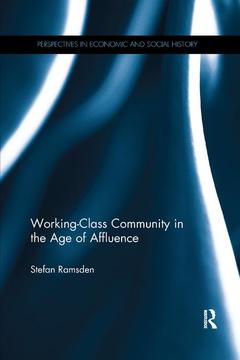Description
Working-Class Community in the Age of Affluence
Perspectives in Economic and Social History Series
Language: English
Subjects for Working-Class Community in the Age of Affluence:
Keywords
Beverley Guardian; Young Men; Working-class history; St Andrew’s Street; Post-war British social history; Jack Binnington; Urban history; Post-war Social Investigators; The age of affluence in Britain; Married Women; The social history of community; Traditional Working Class Community; The sociology of community; Sub-urban Council Estates; Economics; Beverley Evidence; Affluent Era; Post-war Urban Reconstruction; Sociable Leisure; St John Ambulance Brigade; Traditional Working Class Life; Rugby Union Club; Tony Blackshaw; Melanie Tebbutt; Civil Society; Associational Life; Large Family; Material Considerations; Industrial Workplaces; Church Lads; Local Sociability; Local Xenophobia
Publication date: 12-2019
· 15.6x23.4 cm · Paperback
Publication date: 03-2017
· 15.6x23.4 cm · Hardback
Description
/li>Contents
/li>Readership
/li>Biography
/li>
It has appeared to many commentators that the most fundamental change in what it is meant to be working-class in twentieth-century Britain came not as a result of war or of want, but of prosperity. Social investigators documented how the relative affluence of the 1950s and 1960s improved the material conditions of life for working-class Britons whilst eroding their commitment to the shared life of ?traditional? communities.
Utilising an oral history case study of sociability and identity in the Yorkshire town of Beverley between the end of the Second World War and the election of Margaret Thatcher?s government, Working-Class Community in the Age of Affluence challenges this influential narrative. An introductory essay outlines how sociologists and historians understood the complex social, cultural and economic changes of the post-war decades through the prism of affluence, and traces how these changes came to be seen as deleterious to the ?traditional? working-class community. The book then proceeds thematically, exploring change across areas of social life including family, neighbourhood, workplace and associational life.
This book represents the first sustained historical analysis of change and continuity in working-class community living during the age of affluence. It suggests not only that older social practices persisted, but also that new patterns of sociability could strengthen as much as undermine community. Ultimately, Working-Class Community in the Age of Affluence asks us to rethink assumptions about the decline of local solidarities in this pivotal period, and to recognise community as a key feature of working-class life across the twentieth century.
Chapter 1. Introduction
Chapter 2. Families
Chapter 3. Neighbours
Chapter 4. Friends
Chapter 5. Workplaces
Chapter 6. Civil Society and Associational Life
Chapter 7. Identity and Place
Chapter 8. Conclusion
Appendix. Brief biographical details of research participants
Stefan Ramsden is post-doctoral researcher at University of Hull, UK. After a decade working in the museums sector, he decided to pursue his interest in working-class history through returning to full-time study, and completed a PhD in 2013. Since then he has worked as a history teacher, lecturer and researcher in the University of Hull.




